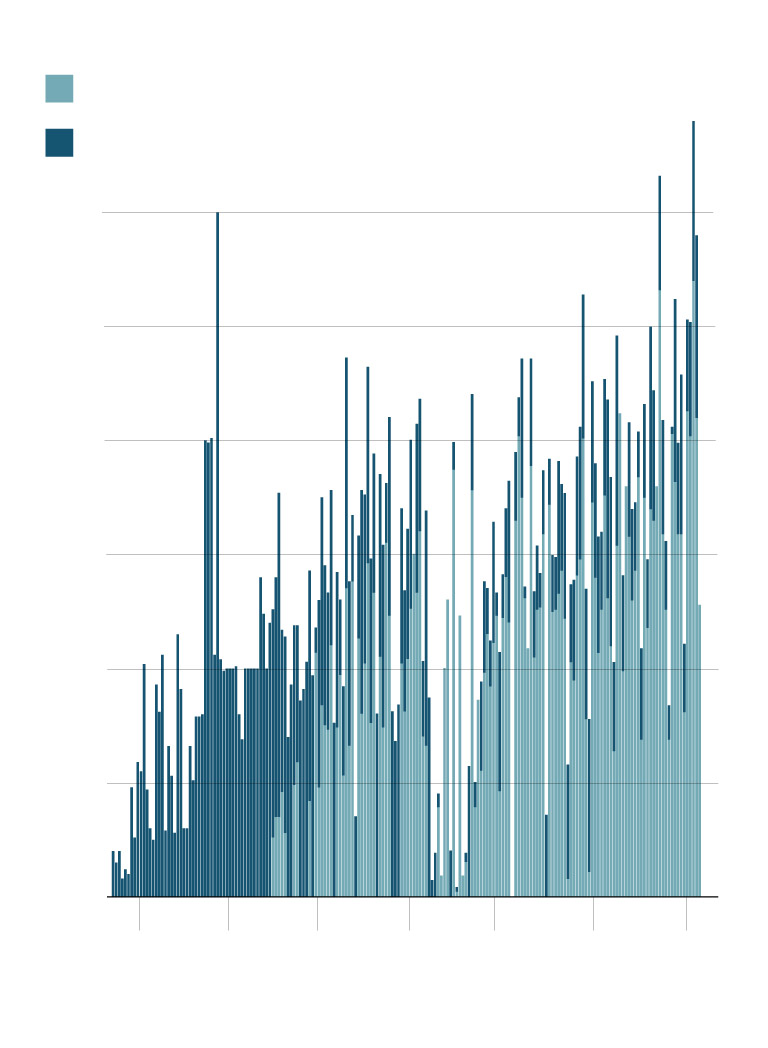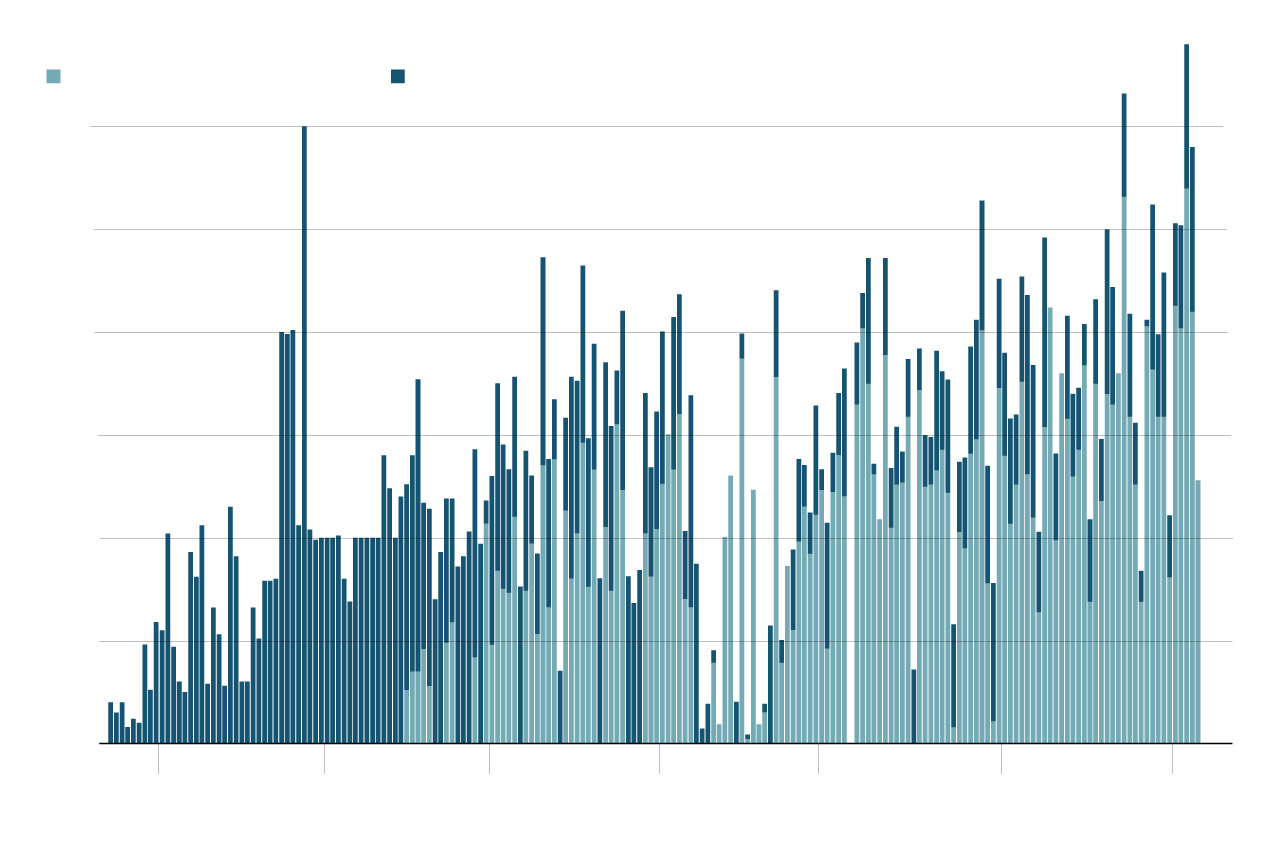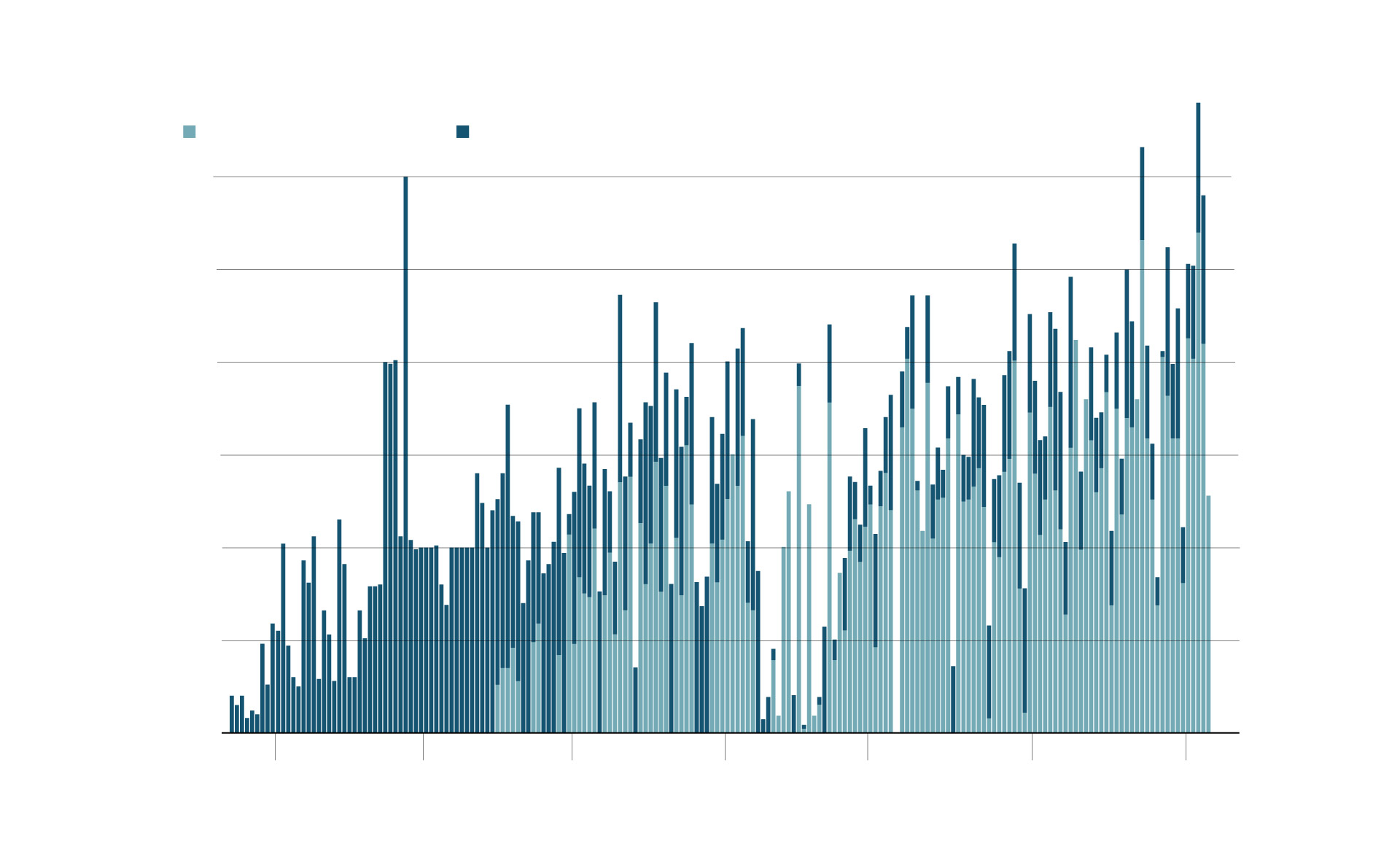The operation imperiled already fragile Israeli relations with Egypt, which has repeatedly warned Israel that military action on the border could violate a four-decade-old peace treaty between the two countries.
“Egypt vehemently denounces the Israeli military operation in Palestinian Rafah, which has resulted in Israel controlling the Palestinian side of the border,” the Egyptian Foreign Ministry said in a statement.
It described the incursion as a “dangerous escalation” that was threatening cease-fire efforts, adding that the operation endangered the lives of the million Palestinians who depend on the crossing for humanitarian aid and a “safe way out for the injured and patients to get treatment.”
Both the Rafah crossing and Kerem Shalom, the two main aid entry points to the south, have been closed by the fighting, according to Israeli and Palestinian officials.
Number of aid trucks entered per day

Number of aid trucks entered per day

Number of aid trucks entered per day

Number of aid trucks entered per day
A photo circulated online and geolocated by The Washington Post showed two Israeli flags raised on the Palestinian side of the crossing point. Another video showed an armored vehicle ramming into a “Gaza” sign flanked by two Palestinian flags by the arrivals hall.
The operation came less than 24 hours after Israel dropped leaflets over the city — now harboring more than a million Palestinians, around half of Gaza’s entire population — ordering them to leave large parts of it. The United States has urged Israel not to carry out an offensive in Rafah without a “credible” plan to evacuate civilians.
But Israel appears intent on upping the pressure on Hamas, whose military capabilities it aims to destroy, while also giving itself additional leverage as it sends mediators to Cairo to reach a deal on freeing its remaining hostages held by Hamas. Just hours before Israel launched its overnight attack, Hamas said it would agree to a Qatari-Egyptian cease-fire proposal, reviving hopes of an extended pause.
It was a day of whiplash for residents, with celebrations over the Hamas acceptance of a deal cut short by intense bombing ahead of the Israeli operation. On Tuesday, thousands crammed the roads to leave, though there was little transport or fuel, said Nebal Farsakh, spokeswoman for the Palestine Red Crescent Society.
“There’s no way to evacuate this number of people safely,” she said, adding that people had scant notice to evacuate before the bombardment began ahead of Israel’s operation. “There’s no way to evacuate half of the population,” she added.
Over the past six months of war, Rafah has become a last refuge for Palestinians, with tents and makeshift encampments choking streets and its open areas. In addition to the United States, a slew of Israel’s allies have voiced their concerns over an invasion of the city.
Israel’s actions leave the Egyptian government in a “very embarrassing situation,” said a former Egyptian politician with knowledge of official thinking. Cairo will be under public pressure to react with a move such as suspending the peace accords between the two countries, he said. Like other officials who discussed behind-the-scenes diplomacy, he spoke on the condition of anonymity due to the sensitivity of the topic.
For months, Egypt has warned Israel against invading Rafah — worried chiefly about the prospect of a full-scale incursion driving mass displacement of Palestinians into Egypt’s Sinai Peninsula, which officials have described as a red line. Egypt, with its staunchly pro-Palestinian population, is concerned about being seen as complicit in the forced displacement of Palestinians. Cairo is also worried about becoming embroiled in the conflict, particularly if Hamas militants were to escape to Sinai or if clashes along the border were to spill over into Egyptian territory.
It has also specifically warned against any Israeli move to secure the no man’s land between Gaza and Egypt, known as the Philadelphi Corridor, a nine-mile-long stretch that Israel controlled before it withdrew from the area in 2005.
Israeli Prime Minister Benjamin Netanyahu, however, has repeatedly said that Israel cannot eliminate Hamas without exercising authority over the border region, including the Rafah crossing.
However much the move has rankled Cairo, the peace treaty is a core pillar in the regional security architecture and Egypt is unlikely to want to jeopardize it, said H.A. Hellyer, a specialist in Middle East security at the Carnegie Endowment for International Peace. He described the range of options available to Egypt as an act of censure as “fairly limited.”
The United States, Egypt and Qatar are continuing to push for a cease-fire to avert a full scale invasion and both Israeli and Hamas delegations were expected in Cairo as early as Tuesday evening.
In the first of three phases of the deal, militants would release 33 women, children and elderly hostages, with three released every three days in exchange for dozens of Palestinian prisoners. It also includes provisions for Palestinians to return home and Israeli troops to withdraw from populated areas.
But an Israeli official, speaking on the condition of anonymity because of the sensitivity of the talks, said there are elements in the latest Hamas proposal that Israel has not agreed to. The Hamas offer brings forward the point at which the two sides would negotiate a full cease-fire, while Hamas is also saying that it is unable to release 33 live hostages in the first phase. It is also demanding that Israel drops a veto on the Palestinian prisoners who are released in exchange for the hostages.
The former Egyptian official, however, countered that the deal “was agreed by the Israeli cabinet before that and we sent it to Hamas.”
While the IDF has asserted that the “vast majority” of the more than 100,000 civilians in the evacuation zone have already left the area, many reached in Rafah said they had few means of leaving, and aid organizations have warned that the Mawasi area in western Gaza where people have been told to move to is poorly equipped to handle an influx.
Abeer Maher, 36, a mother of three who was displaced from Gaza City’s Rimal neighborhood earlier in the war and fled to Rafah, said that transportation costs made it impossible for many to leave. A car to the southern city of Khan Younis now costs more than $300, she said.
“I am seriously terrified,” she said, adding that bombing outside the evacuation zone had kept her family up all night. Many left on foot, bundling their few belongings into bags or onto carts.
Israel’s seizure of the border crossing is likely to significantly impair the entry of humanitarian aid into the besieged enclave, including to the north, where the risk of famine has been most acute.
“The hunger disaster that people are facing, especially in northern Gaza, will get worse if supplies stop coming in,” said Inas Hamdan, a spokeswoman for the United Nations Relief and Works Agency for Palestine Refugees. Farsakh, from the PRCS, described the closure of the crossings as “catastrophic.”
In recent months, Israeli authorities have worked to boost the amount of aid getting into Gaza, opening Erez crossing in the north of the enclave. But the southern entry points still remain vital.
Jeremy Hopkins, UNICEF representative in Egypt, told The Post on that his organization was very concerned about the situation.
“What we continue to advocate for is for there to be additional means of ensuring humanitarian aid goes into Gaza — we need more border points open, we need more options to serve different parts of the Gaza Strip.”
But overall, he added, to ease the suffering of civilians in Gaza: “The only solution is a cessation of hostilities now and that’s the safest thing for children in the Gaza Strip. So we call on all parties to cease hostilities now and then we can access those in need.”
Mahfouz and Parker reported from Cairo and Rubin from Tel Aviv. Hajar Harb in London, Hazem Balousha in Cairo, Evan Hill in Tokyo and Samuel Granados in Córdoba contributed.
